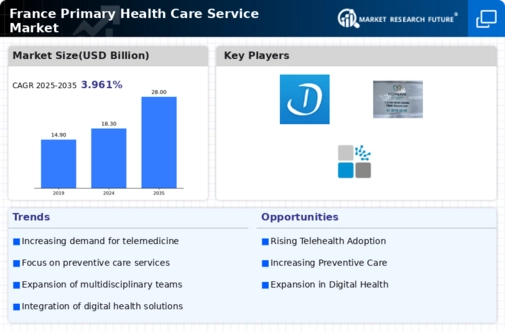Focus on Mental Health Services
The increasing recognition of mental health as a crucial component of overall health is driving changes in the primary health-care-service market. In France, mental health issues affect approximately 20% of the population, highlighting the need for accessible mental health services. The government has initiated programs aimed at integrating mental health care into primary health services, which is expected to enhance the availability of these services. By 2025, it is anticipated that mental health services will account for a larger share of primary care consultations, potentially increasing by 25%. This focus on mental health not only addresses a critical area of public health but also encourages a more holistic approach to patient care within the primary health-care-service market.
Government Initiatives and Funding
Government initiatives play a pivotal role in shaping the primary health-care-service market in France. The French government has been actively investing in healthcare infrastructure and services, with a budget allocation of approximately €200 billion for health in 2025. This funding is aimed at enhancing access to primary care, improving service quality, and integrating innovative health technologies. Such initiatives are likely to bolster the primary health-care-service market by providing necessary resources for healthcare providers and ensuring that patients receive timely and effective care. Furthermore, the government's commitment to universal health coverage reinforces the importance of primary health services, as it aims to reduce disparities in healthcare access across different regions of France.
Aging Population and Increased Demand
The aging population in France is a critical driver for the primary health-care-service market. As the demographic shifts towards an older age group, the demand for health services is expected to rise significantly. By 2030, it is projected that over 20% of the French population will be aged 65 and older. This demographic change necessitates a greater focus on chronic disease management and geriatric care, thereby increasing the need for primary health-care services. The primary health-care-service market must adapt to cater to this growing segment, ensuring that adequate resources and services are available to meet their unique health needs. This shift could potentially lead to an increase in healthcare spending, with estimates suggesting that healthcare expenditures may rise by 3-4% annually to accommodate the needs of the aging population.
Technological Advancements in Healthcare
Technological advancements are significantly influencing the primary health-care-service market in France. The integration of digital health solutions, such as electronic health records and telemedicine platforms, is transforming how healthcare services are delivered. In 2025, it is estimated that over 60% of primary care consultations will utilize some form of digital technology. This shift not only enhances patient engagement but also streamlines healthcare delivery, making it more efficient. As technology continues to evolve, the primary health-care-service market must adapt to incorporate these innovations, ensuring that healthcare providers are equipped to meet the changing needs of patients. The potential for improved patient outcomes and operational efficiencies presents a compelling case for the ongoing investment in health technology.
Rising Health Awareness and Preventive Care
There is a noticeable increase in health awareness among the French population, which is driving the primary health-care-service market. As individuals become more informed about health issues, there is a growing emphasis on preventive care and early intervention. This trend is reflected in the rising participation in health screenings and wellness programs, with a reported increase of 15% in preventive health check-ups over the past two years. Such a shift indicates a proactive approach to health management, which is likely to enhance the demand for primary health-care services. Healthcare providers are thus encouraged to focus on preventive strategies, which could lead to improved health outcomes and reduced long-term healthcare costs.














Leave a Comment